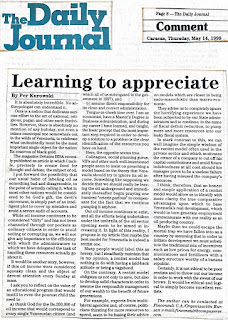Learning to appreciate
It is absolutely incredible. There is no anthropologist who understands it. Ours is a nation that dedicates serious effort to the art of national, religious, pagan and other such festivities. However, there is absolutely no mention of any holiday, not even a minor municipal one somewhere out in the wilds of Venezuela, to celebrate what undoubtedly must be the most important single object for the nation, its reserves of black gold.
The magazine Debates IESA recently published an article in which, precisely to create food for thought and debate, I tackle the subject of oil. I forward the possibility that our usual habit of labeling oil as something bad and disagreeable, to the point of actually calling what in most other nations would be considered to be God’s gift, the devil’s excrement, is simply part of an intelligent plot to cover up mistakes and avoid a severe audit of accounts.
While oil income continues to be considered “dirty” and has not been channeled through our pockets as ordinary citizens in order to avoid soiling or corrupting us, we will not give any importance to the efficiency with which the administrators to which we have delegated the task of handling these resources actually go about it. It would be another story, however, if this oil income would be considered squeaky clean and be the object of devout attention every Sunday at mass.
I ask you to reflect on the value of an educational program that would instill in even the poorest child the need to a) thank God for the Bs. 200,000 of oil income that would correspond to every single Venezuelan citizen (and which all of us have subrogated to the government in 1997), and b) to assume direct responsibility for its clean and correct administration.
Tongue in cheek aside, I am an economist and have a Master’s Degree in Business Administration. During my career if have learned, and taught, the basic precept that the most important step required in order to develop a solution to a problem is the clear identification of the resources you have on hand. Here, the opposite seems true. Colleagues, social planning gurus, VIPs and other such well-intentioned people seem to insist on preaching a model based on the theory that Venezuela should try to ignore its oil income. Something like supposing we decide that we should really be leaving the oil underground and immediately thereafter begin praying one hundred “ceteris paribus” to compensate for the fact that we continue pumping it anyhow.
Our oil income continues to exist, and all the efforts being undertaken under the umbrella of the oil sector opening seem to be aimed an increasing the same. In light of this reality, I propose in my article the thesis that maybe the best model for Venezuela is exactly a rentier one.
Many people would label this as heresy, but I steadfastly maintain that in my opinion, a rentier model has nothing to do with having a laid-back attitude or being a vagabond. On the contrary. A rentier model obligates us not only to save, but also to develop solid characters in order to assume the responsible management of our wealth to the benefit of future generations.
For example, experts from multilateral agencies and, of course, politicians thirsting for more resources to spend, seem to be basing their advice on models which are closer to being sado-masochistic than macro-economic. They advise us to completely ignore the horrifying experience we have been subjected to by our State administrators and to continue, in the name of fiscal deficit reduction, to pump more and more resources into our leaky fiscal system.
In stark contrast to this, we can well imagine the simple wisdom of the rentier model often used in the private sector and which motivates the owner of a company to cut off his capital contributions and avoid future indebtedness at all cost should his manager prove to be a useless failure after having misused the company’s resources.
I think, therefore, that an honest and simple application of a rentier model would allow us to identify with more clarity the true comparative advantages upon which to base Venezuela’s real development and which would in turn generate employment commensurate with our reality as an oil producing country.
Maybe then we could escape the mortal trap we have fallen into as a country by assuming that in order to initiate development we must substitute the traditional mix of incentives such as low prices for energy, communications and fertilizers with a salary structure almost comparative to a banana republic.
Certainly, it is not ethical to be poor rentiers and to throw out our income in order to work with the sweat of our brows. It would be ethical and logical to simply become excellent rentiers.




